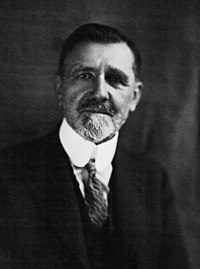Emile Borel
| Émile Borel | |
|---|---|

Émile Borel (1932)
|
|
| Born |
7 January 1871 Saint-Affrique, France |
| Died | 3 February 1956 (aged 85) Paris, France |
| Nationality | French |
| Fields | Mathematics, politics |
| Institutions | University of Paris |
| Alma mater | École Normale Supérieure Paris |
| Thesis | Sur quelques points de la théorie des fonctions (1893) |
| Doctoral advisor | Gaston Darboux |
| Doctoral students | |
| Known for | Measure theory, Probability theory |
Félix Édouard Justin Émile Borel (French: [bɔʁɛl]; 7 January 1871 – 3 February 1956) was a French mathematician and politician. As a mathematician, he was known for his founding work in the areas of measure theory and probability.
Borel was born in Saint-Affrique, Aveyron, the son of a Protestant pastor. He studied at the Collège Sainte-Barbe and Lycée Louis-le-Grand before applying to both the École normale supérieure and the École Polytechnique. Although he qualified for both, he chose to attend the former institution in 1889. That year he won the concours général, an annual national mathematics competition. After graduating in 1892, he placed first in the agrégation, a competitive civil service examination leading to the position of professeur agrégé. His thesis, published in 1893, was titled Sur quelques points de la théorie des fonctions ("On some points in the theory of functions"). That year, Borel started a four-year stint as a lecturer at the University of Lille, during which time he published 22 research papers. He returned to the École normale in 1897, and was appointed to the chair of theory of function, which he held until 1941.
In 1901, Borel married 17-year-old Marguerite, the daughter of colleague Paul Émile Appel; she later wrote more than 30 novels under the pseudonym Camille Marbo. Émile Borel died in Paris on 3 February 1956.
Along with René-Louis Baire and Henri Lebesgue, Émile Borel was among the pioneers of measure theory and its application to probability theory. The concept of a Borel set is named in his honor. One of his books on probability introduced the amusing thought experiment that entered popular culture under the name infinite monkey theorem or the like. He also published a series of papers (1921–27) that first defined games of strategy.
...
Wikipedia
